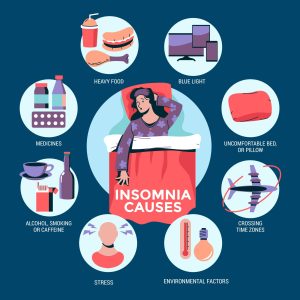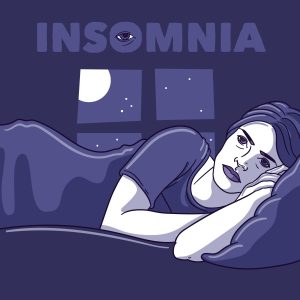Sleep problems are on the rise in our busy world, and insomnia is a common issue. It doesn’t matter how old you are or whether you’re a man or woman; insomnia can affect anyone. It can seriously impact both your body and mind. This guide is here to give you reliable, expert advice on insomnia. We’ll explain what it is, the different kinds, its signs, and many helpful treatments.
Thank you for reading this post, don't forget to subscribe!What Is Insomnia?
Insomnia is a sleep disorder characterized by persistent difficulty falling asleep, staying asleep, or obtaining restorative sleep. It can lead to substantial daytime impairment, impacting mood, energy levels, and overall quality of life. To qualify as chronic, insomnia typically persists for at least three nights a week for three months or more.
Types of Insomnia
Certainly, let’s delve deeper into each of these types of insomnia:
- Stress-Induced Insomnia: This type of insomnia often occurs when stress levels and anxiety are high. People with stress-induced insomnia experience racing thoughts that make it hard to relax and fall asleep. Stress management techniques like relaxation exercises or counseling can be helpful in managing this type of insomnia.
- Behavioral Insomnia: Poor sleep habits play a significant role here. Erratic sleep schedules, excessive consumption of caffeine or alcohol, and prolonged screen time before bedtime disrupt the body’s natural sleep-wake rhythm. Improving sleep hygiene, such as setting a consistent bedtime and reducing screen exposure before sleep, can alleviate this type of insomnia.
- Medical Conditions and Insomnia: Chronic pain, allergies, asthma, and other health issues can lead to discomfort, making it challenging to achieve restful sleep. Treating the underlying medical condition and managing symptoms through medication or lifestyle changes can help improve sleep quality.
- Medication-Induced Insomnia: Certain medications, such as some antidepressants, antihypertensive, and corticosteroids, can interfere with sleep patterns. Discussing potential alternatives or adjusting medication doses with a healthcare provider can mitigate this type of insomnia.
- Mental Health-Related Insomnia: Conditions like depression and bipolar disorder often coexist with insomnia. Treating the underlying mental health issue through therapy, medication, or a combination of both can help alleviate insomnia symptoms.
- Environmental Factors: Environmental factors like excessive noise, bright lights, or an uncomfortable sleeping environment can contribute to insomnia. Creating a soothing sleep environment by reducing noise and light, investing in a comfortable mattress, and maintaining an ideal room temperature can make a significant difference.
- Shift Work and Jet Lag: Irregular work schedules or sudden time zone changes disrupt the body’s internal clock, leading to sleep disturbances. Strategies like gradually adjusting to new schedules and using light therapy for shift work can help the body adapt to these changes and improve sleep quality.
Understanding the specific factors contributing to insomnia is crucial in finding effective solutions. Tailoring interventions to address the root causes of insomnia can significantly enhance the chances of achieving restful and rejuvenating sleep.

Signs of Insomnia
Certainly, let’s explore these aspects of insomnia further:
- Difficulty Initiating Sleep: Insomnia often starts with the inability to fall asleep, even when a person feels physically tired. This can be frustrating and can lead to anxiety about bedtime.
- Frequent Nighttime Awakening: People with insomnia may wake up several times during the night and have difficulty going back to sleep. These awakenings disrupt the natural sleep cycle and can leave individuals feeling fatigued the next day.
- Daytime Fatigue: One of the most noticeable effects of insomnia is daytime sleepiness and fatigue. It’s as if the body didn’t get the rest it needed during the night, leading to decreased energy levels, reduced productivity, and increased irritability.
- Impaired Cognitive Function: Insomnia can impact cognitive functions such as memory, concentration, and decision-making. This can affect work performance and daily activities, making it harder to think clearly and stay focused.
- Mood Swings and Disturbances: Sleep and mood are closely connected. Insomnia can lead to mood swings, heightened irritability, and emotional disturbances. It’s also associated with a higher risk of developing anxiety and depression over time.
- Physical Symptoms: Insomnia doesn’t just affect the mind; it can manifest physically too. Headaches, gastrointestinal discomfort (like stomachaches or indigestion), and muscle aches can be experienced as a result of chronic sleep deprivation and stress.
These symptoms collectively emphasize the far-reaching impact of insomnia beyond just a lack of sleep. It affects mental and physical health, daily functioning, and overall well-being. Recognizing these signs is crucial for early intervention and seeking appropriate treatment to improve sleep quality and overall health.
Also read : Importance of 8 hours of sleep

Remedies and Treatments for Insomnia
- Lifestyle Adjustments
Sleep Hygiene: Create a consistent sleep schedule, establish a comfortable sleep environment, and limit caffeine and alcohol intake.
Stress Management: Employ relaxation techniques, such as meditation or deep breathing exercises, to alleviate stress and anxiety.
- Cognitive Behavioral Therapy (CBT)
CBT for insomnia offers a non-pharmacological approach to altering negative thought patterns and behaviors linked to sleep.
- Medications
Prescription Medications: Sometimes, healthcare professionals may prescribe sleep aids for short-term relief. However, these should be used with caution due to potential dependency.
- Alternative Therapies
Herbal Supplements: Certain herbs like valerian root and melatonin supplements can promote sleep when administered under medical guidance.
Acupuncture and Yoga Holistic approaches like acupuncture and yoga may enhance sleep quality.
Insomnia is a common sleep problem that can affect your life a lot. To deal with it, you should first understand what it is, know the different types, and be able to recognize the signs. It’s also essential to know about the ways to treat it, like taking medicine, changing your lifestyle, or trying holistic therapies. But the best thing to do is to talk to a healthcare expert who can help you find the right solution and get the good, refreshing sleep you need.



